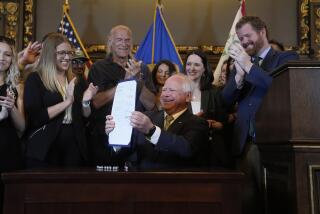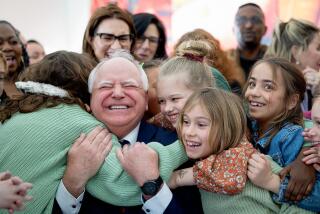Gov. Engler Leads List as Dole’s Ticket Choices Weighed
- Share via
DETROIT — At a time when many Republicans are arguing about whether their conservative thrust on Capitol Hill has swept them too far from the political mainstream, GOP Gov. John Engler of Michigan harbors no such doubts. “Republicans should stay the course and hang in there for the fundamental change that they stand for,” he said.
The significance of the governor’s views, spelled out in a recent interview here, extend far beyond the borders of his own state. The 47-year-old Engler is high on everyone’s short list of prospective GOP vice presidential candidates. And Bob Dole’s choice of a running mate has taken on an extra dimension, becoming part of the ongoing struggle over the party’s future.
One reason for the enhanced significance of Dole’s decision is his age. Soon to turn 73, he would be the oldest chief executive to begin a first term, thus making the credentials and beliefs of his understudy particularly salient.
More fundamentally, the GOP and the overall political process have been going through a period of upheaval. And Dole, more than a year after launching his third quest for the presidency, has yet to provide a coherent view of the role his party should play in the still emerging new political order.
With his dramatic decision last week to resign from the Senate, Dole set out to remedy that deficiency. But nothing he will do between now and the Republican National Convention in August will likely provide a better clue of where he wants to lead than his choice of a vice presidential candidate.
Given that the competition for the vice presidency is really a battle for Dole’s mind, it demands finesse and indirection. The code of conduct requires prospects to first disavow ambition for the job, then go about their business in the hopes that favorable publicity or well-placed supporters will cause Dole to look in their direction.
It can be an awkward minuet. Last week, when a dozen or so GOP governors were asked en masse which of them would refuse the job if offered, only one hand immediately shot up--that of New Jersey’s Christine Todd Whitman. After a moment or two, several of her colleagues, looking slightly abashed, raised their hands as well.
But for all the apparent restraint, evidence of the underlying conflict within the party over the decision is not hard to find. In the past, pragmatic politics weighed most heavily in vice presidential selection: Could the prospective candidate help carry a given state or region? But in the Republican Party of 1996, broader, more ideological concerns dominate.
Conservatives, many of whom still nurse doubts about Dole’s ideological reliability because of the reputation for pragmatism that he earned in the Senate, clamor for reassurance in the choice of a running mate. “I do not believe Bob Dole can take a chance on selecting someone that the pro-family community would find unacceptable,” said Ralph Reed, executive director of the Christian Coalition.
But other Republicans, including some of Dole’s advisors, think he should pick someone to help broaden the GOP’s appeal. “We need a symbol of tolerance,” one senior advisor said. “Right now, we look very rigid and inflexible.”
For this source and others of like mind, the top choice would be retired Gen. Colin L. Powell. Though Powell has publicly rejected the idea of running for vice president, sources close to the Dole campaign said the presumptive presidential nominee has not given up on the idea of trying to get Powell to change his mind.
Some analysts think that Dole needs someone of Powell’s stature to counter continuing Democratic efforts to link the Kansas senator to House Speaker Newt Gingrich (R-Ga.), whose own poll ratings are among the most negative of any prominent politician. “That makes it even more important for Dole to overcome that impression by selecting a big name,” said University of Wisconsin political scientist Charles Jones, a Powell enthusiast.
But the very mention of Powell’s name raises hackles among conservatives because of his deviation from many of their positions, notably his support for abortion rights and affirmative action. “It would be a contentious decision,” remarked a GOP consultant who is an Engler fan.
Conservatives argue that to be true to his party, Dole needs to pick one of their kind. When discussions turn in this direction, Engler’s name is one of the most prominent.
“Of all the guys that are being looked at, he has the strongest conservative credentials,” contended Mike Murphy, a consultant who helped run Engler’s two successful gubernatorial campaigns.
Engler established his conservative bona fides early in his career. As a state legislator still in his 20s, he set up a fund to help recruit and fund conservative candidates to help overturn Democratic majorities in the Michigan Legislature. That didn’t sit well with Michigan’s moderate Republican Gov. Bill Milliken. “There was an objection to this upstart legislator who was raising funds to help candidates outside the official auspices of party leaders,” Engler recalled.
But Engler stuck to his guns and rose to the post of GOP Senate leader before upsetting a heavily favored Democratic incumbent to win the governorship in 1990. In office, he cemented his ties to conservatives by dismantling the state’s general assistance program, which provided welfare payments to able-bodied non-parents, and withstood a storm of criticism from Democrats who branded him a heartless penny-pincher. After two failures, he persuaded the voters to scrap the property tax in favor of a sales tax hike to finance public education.
Helped immeasurably by an auto industry boom that revived his state’s economy, Engler won reelection in a walk in the 1994 election that also put the GOP in charge of Capitol Hill.
Engler firmly believes that he and his party are riding the locomotive of history. “We started showing that at the state level you could do some things that could open up to people the potential that government can make a difference in terms of reversing the direction that they have been unhappy with,” he said.
Along with his ideological commitment, Engler brings other assets to the table. He hails from a large, usually pivotal state (though the recent track record of vice presidential candidates winning their home turf for their ticket is mixed). He also is a Roman Catholic, a constituency that some analysts regard as the jump ball of American politics.
But Engler also brings some baggage with him. For one thing, while a student at Michigan State in the 1960s, he was twice rejected for the draft because, he explains, he was “a couple of pounds” overweight.
“It’s no problem because I reported [for the draft] and did exactly what the Army requested I do,” Engler said. “They made the decision, not me.”
Nonetheless, disclosure of the episode has made Engler the target for gibes in the Michigan press from critics who wonder why he did not lose the surplus weight so he could serve his country; one columnist refers to him as “His Imperial Roundness.”
And this raises the possibility that under the intensive scrutiny of a presidential campaign, Engler would become the butt of ridicule. This would be no laughing matter for Republican hopes of making a key element in their campaign against Clinton the contrast between Dole’s record of heroism in World War II combat and the president’s avoidance of the draft during the Vietnam War.
Nor is this Engler’s only problem. Though his admirers laud him for his tenacity and aggressiveness, these traits sometimes cause him to irritate other politicians--among them, by some accounts, Dole. “Engler is too arrogant and belligerent for Dole,” one well-placed GOP source said. “And for Dole, personality style is hugely important.”
Some Republicans think Dole would be better off to select another Midwestern Catholic governor, George Voinovich of Ohio, who is considered less abrasive in personality, more moderate in his views and broader in background, having been mayor of Cleveland before becoming his state’s chief executive. Apparently trying to set off a Voinovich-for-veep boom, his media consultant recently sent out a video on him called “Working Harder, Working Smarter” to GOP leaders and journalists around the country.
Voinovich, though, refuses to give interviews about any subject touching on national politics; his press secretary says he does not want to create the impression he is running for the vice presidency.
Conservatives complain that Voinovich is too much of a tax-and-spend politician to be next in line for the presidency. “Rockefeller Voinovich,” the Wall Street Journal recently branded him in an editorial.
Such sniping may cause Dole to weary of trying to make an ideological statement with his choice and simply settle on someone he likes, trusts and respects, such as Sen. John McCain of Arizona. The trouble with that approach, analysts say, is that the last thing the Republicans need on their national ticket is another Washington-based politician, let alone one from a state that is one of the party’s most reliable strongholds.
In the end, Dole may find that picking a vice president, like much else in politics, is an exercise in damage control.
“First you say to yourself, ‘Who can help me win the presidency?’ ” said David Keene, a Dole advisor. “Then you realize, ‘Nobody can help me but myself.’ Then you say, ‘If there isn’t somebody who can win it for me, is there somebody who could lose it for me?’ So it becomes a game of subtraction rather than addition.”
More to Read
Get the L.A. Times Politics newsletter
Deeply reported insights into legislation, politics and policy from Sacramento, Washington and beyond. In your inbox twice per week.
You may occasionally receive promotional content from the Los Angeles Times.








